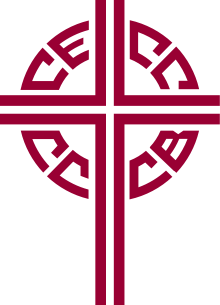Canadian Conference of Catholic Bishops
 | |
| Abbreviation | CCCB |
|---|---|
| Motto | Teach, Govern, Sanctify |
| Formation | 1943 |
| Legal status | Civil nonprofit |
| Purpose | To support the ministry of bishops |
| Headquarters | Ottawa |
Region served | Canada |
Membership | Active and retired Catholic bishops of Canada |
President | Paul-André Durocher |
Main organ | Conference |
Parent organization | Holy See |
Staff | 40 |
| Website |
www |
The Canadian Conference of Catholic Bishops (CCCB) (French: Conférence des évêques catholiques du Canada) is the national assembly of the bishops of the Catholic Church in Canada. It was founded in 1943, and was officially recognized by the Holy See in 1948. Since the Second Vatican Council, it became part of a worldwide network of episcopal conferences, established in 1965, as an integral part of the life of the universal Church. Up until 1977, it was called the Canadian Catholic Conference. The change reflects more clearly the fact that it is an association of bishops.
According to its statutes, together the bishops exercise certain pastoral functions for Catholics in Canada, respecting the autonomy of each bishop in the service of his particular church.
Through the work of its members, the Conference is involved in matters of national and international scope in areas such as ecumenism and interfaith dialogue, social justice, aid to developing countries, the protection of human life, liturgy and Christian education. It also provides the bishops with a forum where they can share their experience and insight on the life of the church and the major events that shape society.
The members of the Episcopal Conference include: all diocesan bishops in Canada and those equivalent to them in law, all Coadjutor bishops, and auxiliary bishops. Also included in the Episcopal Conference are titular bishops of any rite within the Catholic Church who exercise in the territory a special office assigned to them by the Apostolic See or by the Episcopal Conference.
General secretariat
To assist them in their pastoral work, the bishops have established a permanent bilingual secretariat in Ottawa, which includes various offices and services.
In the Ottawa offices of the CCCB, a staff of about 40 people, laypersons, priests and religious, are at the service of the bishops. The National Liturgy Office of the CCCB is located in Montreal.
The secretariat assists in coordinating activities and information, and in maintaining contacts with the Holy See and other Episcopal conferences, as well as with churches, ecclesial communities, faith groups and government authorities at the national and international levels. It also works in collaboration with the four regional Episcopal assemblies in Canada.
Episcopal commissions and Aboriginal Council
Twelve Episcopal commissions and one council are at the service of the Canadian Conference of Catholic Bishops.
Each commission specializes in one pastoral area, to guide and support the bishops in their ministry. Driven by the work and expertise of four bishops and one secretary (consultants and observers can also join the groups), each commission studies current events, analyses the needs for the Church in Canada, and organizes projects aimed at supporting Christian communities.
Six of the commissions are national – formed by bishops equally distributed between the French and English sectors – while the five others are named “sectoral” because they are divided depending on the language of the member bishops. Three of those commissions are from the English sector, while two originate from the French sector.
The Catholic Aboriginal Council encourages Aboriginal leadership in the Christian community. CCCB Publications is the official publishing arm of the Canadian bishops.
List of presidents
- 2013-2015 : Paul-André Durocher, archbishop of Gatineau
- 2011-2013 : Richard William Smith, archbishop of Edmonton
- 2009-2011 : Pierre Morissette, bishop of Saint-Jérôme
- 2007-2009 : James Weisgerber, archbishop of Winnipeg
- 2005-2007 : André Gaumond, archbishop of Sherbrooke
- 2003-2005 : Brendan O'Brien, archbishop of St. John's
- 2001-2003 : Jacques Berthelet, bishop of Saint-Jean-Longueuil
- 2000-2001 : Gerald Wiesner, bishop of Prince George
- 1997-2000 : Jean-Claude Turcotte, archbishop of Montreal
- 1995-1997 : Francis John Spence, archbishop of Kingston
- Marcel Gervais, archbishop of Ottawa
- James Martin Hayes, archbishop of Halifax
- 1985- : Bernard Hubert, bishop of Saint-Jean-Longueuil
- Joseph MacNeil, archbishop of Edmonton
- Jean-Guy Hamelin, bishop of Rouyn-Noranda
- 1975-1977 : Gerald Emmett Carter, archbishop of Toronto
- 1973-1975 : Jean-Marie Fortier, archbishop of Sherbrooke
- Alexander Carter, bishop of Sault-Sainte-Marie
- 1963-1965 : George Flahiff, archbishop of Winnipeg
See also
External links
- Canadian Conference of Catholic Bishops official website